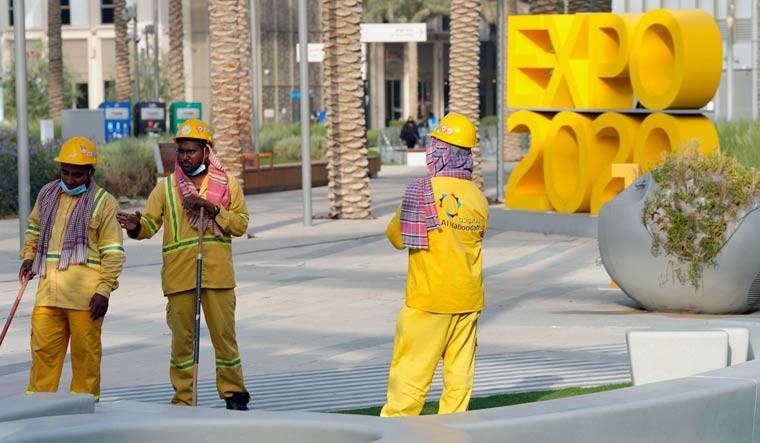During his high-profile visit to the emirate’s Expo 2020, Congolese President Félix Tshisekedi joined Dubai leader Sheikh Mohammed bin Rashid Al Maktoum to sign several cooperation agreements designed to promote bilateral trade and boost Emirati investment in Africa’s second-largest country. While in Dubai, Tshisekedi also spoke at the Global Business Forum Africa, telling his hosts that the Democratic Republic of the Congo (DRC) would “like to learn from the lessons of the UAE” while also stressing his country’s openness to Emirati investors.
Tshisekedi’s visit is only the latest in a series of global engagements on the part of the UAE, which seeks to expand economic links not just with existing trading partners like India but also with new markets in Africa and beyond. It is also part of a greater trend among African leaders to strike deals with new counterparts beyond Europe, China, and the United States.
Tshisekedi in Dubai
The DRC has had a difficult time consistently attracting foreign investment since winning independence from Belgium in 1960. After the dictatorship of Mobutu Sese Seko, the DRC suffered in the 1990s and early 2000s during the first and second Congo Wars, and continued to face political instability after peace was brokered in 2003.
But things are changing quickly. The election of Tshisekedi as the country’s president in 2019 marked the first time a transition of power took place peacefully in the DRC, sparking renewed interest from foreign investors. Tshisekedi’s term as chair of the African Union, a post he will hold until February, has further bolstered the country’s international image, with the Congolese leader speaking for over 1.2 billion Africans on matters ranging from vaccine inequality to climate change and security.
That has made Tshisekedi’s visit to Dubai a high-profile affair, during which the two countries sealed treaties and memoranda of understanding touching on sectors as diverse as trade, tourism, education, health, mining, infrastructure, and defence. Trade flows between the UAE and the DRC have increased by 94 per cent between 2017 and 2020, cementing their growing ties.
With a population of 90 million, more than half of whom are under the age of 20, and an estimated $24 trillion in untapped natural resources such as cobalt and copper, the DRC president sees immense potential for his country to emerge as a regional leader. Tshisekedi, mindful of the need for outside capital to achieve that objective, is looking to foreign investors (like the Emirates) who recognise that Africa “does not need charity” but instead constructive partnerships.
UAE joins an investment scramble in Africa
The UAE, for its part, is looking beyond the Middle East to deepen economic partnerships with the most dynamic Asia and African economies, which include Ethiopia and Kenya alongside the DRC. This is good news for sub-Saharan Africa as a whole, which needs infrastructural investments and outside capital to achieve development objectives and prepare for the changes wrought by population growth and climate change.
Perhaps, the biggest short-term challenge for Africa is overcoming the economic effects of the Covid-19 pandemic, which has reduced rates of foreign direct investment (FDI) and has often damaged the economies of vulnerable countries the most severely. While $77 billion in greenfield investment poured into Africa in 2019, only $29 billion came in 2020. Currently, only one per cent of global foreign direct investment ends up in Africa, compared to 20 per cent in Asia.
The current crisis might have the silver lining of allowing Africa to accelerate its move away from unsustainable sectors. While more than half of all inbound greenfield FDI went into mining and fuel extraction between 2006-2010, only 21 per cent was directed to these two sectors a decade later. Sustainable sectors like renewable energy, e-commerce, and tourism would better serve the continent in maintaining long-term growth, and countries like the DRC, with its lush rainforests and potential for hydropower, are well positioned to build upon these emerging industries.
With countries like the UAE emerging as alternatives to European, American, and Chinese investment, African governments now have more partners to choose from and can secure more advantageous agreements. The Emirates is betting big on sub-Saharan African investments; according to a report by the Dubai Chamber of Commerce and Industry. Fintech, healthcare, agriculture and e-commerce are all considered to be high-potential sectors, with fintech in particular proving the most appealing among surveyed business leaders.
A global approach
Already a major economic partner for the UAE, India is also emerging as the focus of efforts by the Emirates to become a recognised global hub for business and finance. India’s dynamic position in the global agriculture, IT, clean energy, and food processing industries makes it an important market for the Emirati business sector, and the two countries announced during the Dubai 2020 Expo that they are seeking to more than double non-oil bilateral trade to at least $100 billion over the next five years. The UAE has also committed to invest $75 billion of its sovereign funds in India, with Commerce Minister Piyush Goyal pointing to initiatives such as Prime Minister Narendra Modi’s “one world, one grid” green energy project.
As the UAE, alongside other Middle Eastern nations, goes to great lengths to shift its economy away from fossil fuels, it sees investments in clean energy and deepened economic partnerships with other emerging countries. While the strategy may ruffle feathers in Washington and Beijing, a world where the UAE is competing with China and the US and contributing to a larger pool of global investment can only bring benefits to those living in the developing world.












